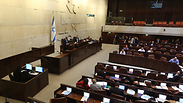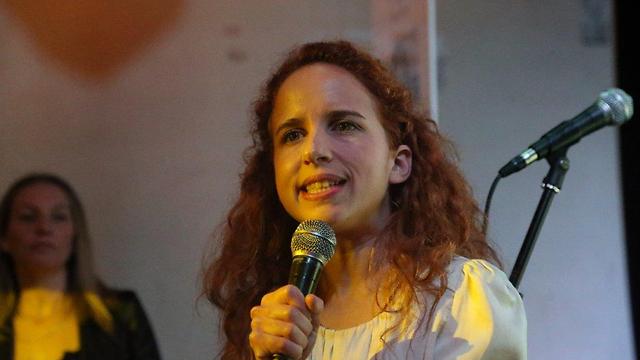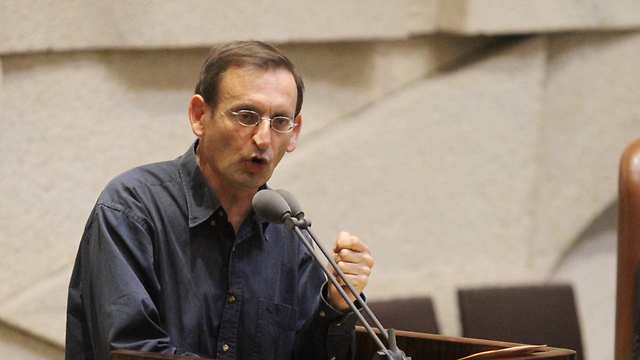
Controversial proposal to limit legislation sparks heated debate
The speaker of the Knesset, together with two MKs, are leading a reform that would limit the number of private bills that could be filed by MKs; the proposal has been both hailed as an important step to improve the Knesset's ability to function and lambasted as an indirect way to limit its authority.
Justice Minister Ayelet Shaked and Tourism Minister Yariv Levin's proposal to increase Knesset supervision of the government while limiting the number of laws passed by the legislator was met with objection from both the coalition and opposition on Sunday.
The proposal, which will be discussed on Monday in a special committee, has sparked quite a debate among Knesset members.
"I presented the justice minister with a proposal similar to hers, including canceling the preliminary reading and sending bills straight to the committees, as well as allowing every MK who submits a bill to appear before the Ministerial Committee for Legislation," said Coalition Chairman MK David Bitan (Likud). "(Shaked and Levin) forgot my proposal, and that's why I'm opposed to theirs."
On giving the Knesset authority to supervise the government, Bitan said the proposal "has no balances," adding "This is the Knesset's job, and we don't need the government to implement our legal right."

The Chairman of the Knesset's House Committee, MK Yoav Kish (Likud), said that while the initiative was a step in the right direction, it was flawed. "I believe that significant improvements in the Knesset's regulations and in the Knesset's supervision over the government are needed, but I won't allow for a situation in which the Knesset and its members are stripped of their authority and role—to legislate and supervise."
Zionist Union MK Itzik Shmuly criticized the bill proposal as "delusional and dangerous."
"After the government's efforts to eliminate the press and the judiciary, now it's the legislature's turn," Shmuly said. "The Knesset speaker must not cooperate with an initiative meant to weaken and trample on the Knesset. Not only does the government not do its job in many fields, now it wants to limit the Knesset's ability to do its job as well? There is nothing to strengthen supervision here."
In response to Shaked's claim that over-legislation limits civil liberties, he argued it was "the social reality and the government's inaction are the things that limit liberties for the weak, not legislation."
Zionist Union MK Merav Michaeli called the plan to limit the Knesset's private bill proposals "the gagging of the Knesset in general and particularly the opposition."
"I regret that the Knesset speaker opposes such a unilateral move done by the government without involving representatives from the opposite," she added.
"It's already well known that democracy is the governing system the current prime minister prefers least, and this move is another step in his work to limit it," Michaeli concluded.
MK Stav Shaffir, also of the Zionist Union, referred to Shaked, saying, "She wants to strengthen the Knesset? She should start by approving my bill proposal for transparency in the Ministerial Committee for Legislation, which was signed by 64 MKs but is still waiting and pushed from one week to the next by her secret committee because the ministers are not willing to report to the public how they voted on significant social legislation."
Shaffirs, who heads the Knesset's Special Committee for the Transparency and Accessibility of Government Information, went on to accuse the government of "doing everything it can to avoid having to answer to the public's representatives—the Knesset—for its decisions. The government is breaking new records in weakening the Knesset in an attempt to prevent the public from knowing what it is doing with our tax money and in an effort to expedite legislation that is harmful and dangerous to the State of Israel.

"Strengthening the Knesset's supervision over the government's work is an important goal, but for the government's initiative to be considered serious, it must prove that it's following the rules that already exist in the Knesset's regulations—such as the requirement of ministers and state employees to appear in front of Knesset committees, the supervision over the budget and the changes made to it, and the existing procedures for legislation and for voting on it. These are principles that the government bends and tramples on one after another to prevent the public from understanding how decisions are being made here and what are the consequences of these decisions, and so they could close 'deals' behind our backs."
Meretz Chairwoman MK Zehava Galon warned that "without private bills, Israel's socio-economic situation will be more inadequate and less equal."
MK Dov Khenin (Joint List) joined the criticism: "First they attacked the NGOs, the media, the courts and the (Israeli) Arabs. Now they attack the Knesset. Democracy is getting in the way of the government and therefore they are acting to diminish it. Private bills in the Knesset is what pushed protective legislations for the downtrodden, the environment, human rights."

MK Ahmad Tibi (Joint List) added: "This is a dangerous and one-sided initiative that weakens parliamentary work, and it is hard to understand why the Knesset speaker is for it and not against it. What is needed right now is transparency… we should not limit private bills any further."
In contrast, Leader of the Yesh Atid Party MK Yair Lapid supported the initiative, saying "it is the start of a great move to strengthen the Knesset. It is time for members of the Knesset to really be able to act as representatives of the public instead of filing unnecessary bills. It's been a long time now that the madness should have been stopped, where each year thousands of law proposals are filled that encumber the Knesset and its duties and smother the public with pointless regulations."

Lapid added that "this initiative will assist public representatives to start dealing with government oversight, by promoting substantial pubic initiatives instead of filing unnecessary bills and acting like PR employees. We're happy to see that this subject is being addressed after a series of petitions to limit legislation and strengthening the Knesset. I applaud MKs Shaked and Levin and Speaker of the Knesset Edelstein for this initiative and will do my best to help promote it."
MK Haim Jelin (Yesh Atid) added that "the downpour of private bills needs to stop. The thousands that get filed each year bog down the Knesset and government, who are forced to work around them instead of reducing regulations to ease on the public. Private bills need to be served in a measured fashion… and when there is a chance they will pass and enter the legislation, not just newspapers and morning talk shows."
MK Elazar Stern (Yesh Atid) also welcomed the proposal and called for Edelstein to expedite the ruling on it. "This is a step in the right direction, and we hope that the government will indeed help assist the promotion of the reform that will improve the Knesset's function because as it stands its efficiency as an overseeing and legislating body has many faults," said Stern.
Not everyone in the Yesh Atid party shared this optimism, as MK Karin Elharar, while supporting the initiative, said that "As it stands, Shaked's reform does not do much to increase the Knesset's effectiveness in government oversight. We need to ensure an effective parliamentary toolset with which every MK could promote his agenda. Today's public representatives have nearly no power other than to create noise and headlines, and this is not even taking into consideration the gap in legislative power between the opposition and coalition that leave the opposition with no real ability to influence or make a change."
The Israel Democracy Institute stated that this reform correlates with the institutes recommendations. "According to current data, Israel is the world's record holder in private legislation. Over the last 15 years more than 22,000 private bills have been filed in its parliament. This situation harms government oversight and public trust in the members of the Knesset. It is for this reason that the proposed amendments are an important part of a package that must be accepted to improve the means of oversight by MKs."










